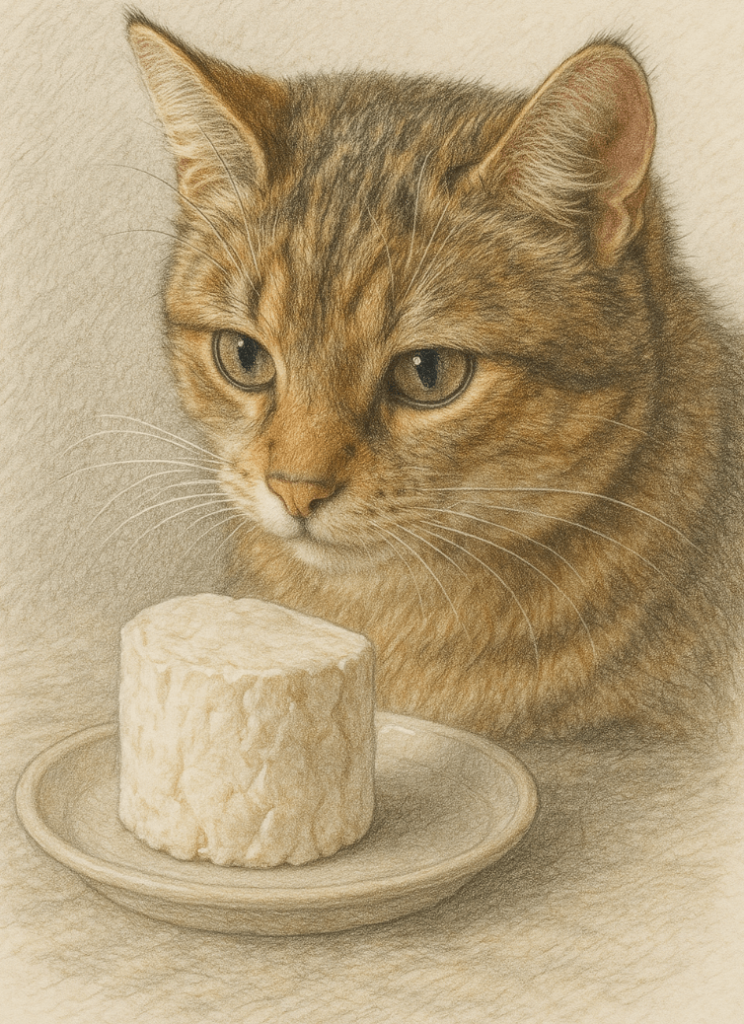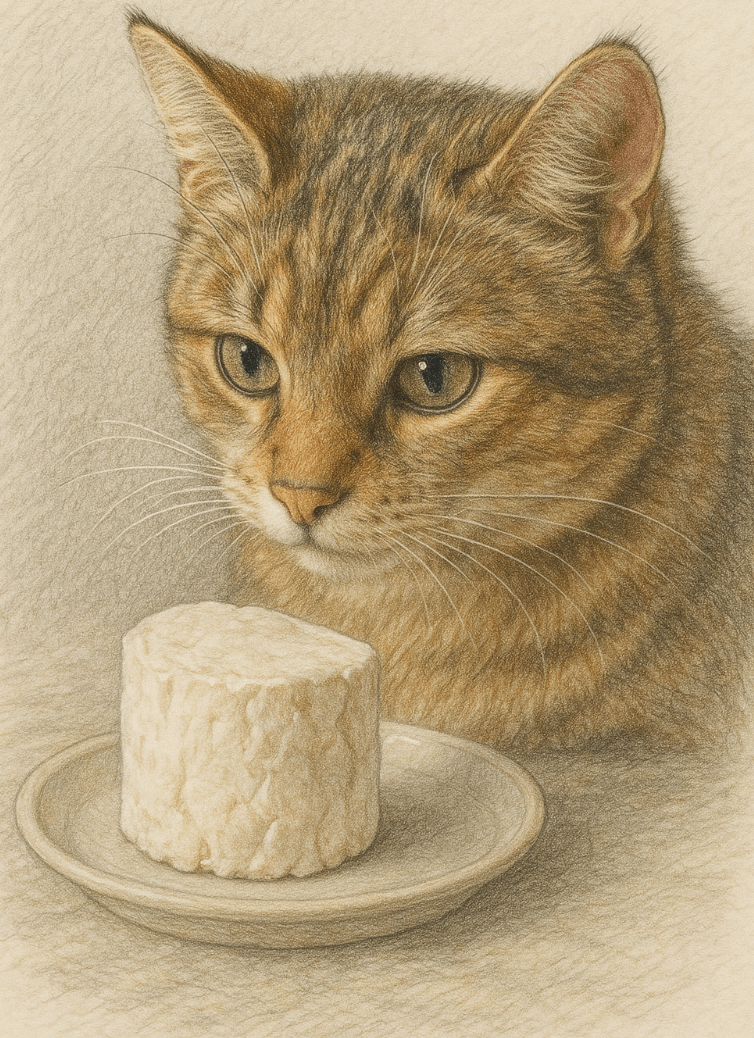Can Cats Eat Goat Cheese?
When it comes to feeding our feline friends, many pet owners wonder whether human foods like goat cheese are safe for cats. While cats are obligate carnivores and thrive on a meat-based diet, they may occasionally show interest in dairy products. Goat cheese, known for its creamy texture and tangy flavor, might seem like a tempting treat to share with your cat—but is it truly safe? In this blog post, we’ll explore the potential benefits and risks of feeding goat cheese to cats, examine alternatives, and provide expert advice to help you make informed decisions about your cat’s diet.
Potential Risks of Feeding Goat Cheese to Cats
While goat cheese isn’t inherently toxic to cats, it does come with certain risks that every pet owner should consider before offering it as a treat.
Lactose Intolerance:
Most adult cats are lactose intolerant, meaning they lack the enzymes needed to digest dairy products properly. This can lead to digestive upset, including diarrhea and vomiting.High Fat Content:
Goat cheese contains a significant amount of fat, which can upset your cat’s stomach or contribute to obesity if consumed in excess.Salt and Additives:
Many types of goat cheese are high in sodium or contain added herbs and spices, which can be harmful to cats.Allergic Reactions:
Some cats may have sensitivities or allergies to dairy, leading to symptoms like itching, swelling, or gastrointestinal distress.Choking Hazard:
Large chunks of cheese can pose a choking risk, especially for smaller cats or those prone to gulping food.
Understanding these risks ensures you approach feeding goat cheese to your cat with caution and moderation.
Benefits of Goat Cheese (When Offered Safely)
Although goat cheese isn’t a necessary part of a cat’s diet, it does offer some minor benefits when given in small amounts and under specific conditions.
Easier Digestibility Compared to Cow’s Milk:
Goat cheese generally has less lactose than cow’s milk products, making it slightly easier for some cats to tolerate.Rich in Nutrients:
Goat cheese contains calcium, protein, and essential vitamins that can support bone health and overall vitality in small doses.Palatability for Picky Eaters:
The creamy texture and mild flavor of goat cheese may entice cats who are reluctant to eat during illness or recovery.Low Lactose Options Available:
Certain varieties of goat cheese are lower in lactose, reducing the likelihood of digestive issues.Hydration Boost (Soft Varieties):
Soft goat cheese contains moisture, which can help keep your cat hydrated, especially if they’re not drinking enough water.
While these benefits exist, they must be weighed against the potential risks to determine if goat cheese is suitable for your cat.
Check this guide 👉Can Cats Eat Mice? Best 7 Expert Tips!
Check this guide 👉Can Cats Eat Mozzarella Cheese? Best 7 Expert Tips!
Check this guide 👉Can Cats Eat Chives? Best 7 Expert Tips!

Safe Alternatives to Goat Cheese | Risks of Unsafe Dairy Choices |
|---|---|
Plain cooked chicken (unseasoned) | High-lactose cow’s milk or cream |
Cat-safe wet food | Processed cheeses with additives |
Plain pumpkin puree | Cheeses high in salt or spices |
Small amounts of plain yogurt | Raw or unpasteurized dairy products |
Hydrating bone broth (no salt added) | Hard cheeses that pose choking hazards |
How to Safely Offer Goat Cheese to Your Cat
If you decide to give your cat a taste of goat cheese, it’s important to follow these guidelines to minimize risks and ensure their safety.
Choose Plain Goat Cheese:
Avoid flavored or seasoned varieties, as these often contain ingredients like garlic or onion that are toxic to cats.Start with Tiny Portions:
Offer only a pea-sized amount initially to see how your cat reacts. Monitor for signs of digestive upset.Opt for Low-Lactose Options:
Look for goat cheese labeled as low-lactose to reduce the risk of gastrointestinal issues.Serve as an Occasional Treat:
Limit goat cheese to rare occasions rather than incorporating it into their regular diet.Consult Your Veterinarian:
Always check with your vet before introducing new foods, especially if your cat has pre-existing health conditions.
By following these steps, you can safely indulge your cat’s curiosity without compromising their well-being.
Signs Your Cat May Not Tolerate Goat Cheese
Even if you take precautions, some cats simply can’t handle goat cheese due to individual sensitivities. Watch for these warning signs after offering it to your cat.
Diarrhea or Vomiting:
These are common symptoms of lactose intolerance or an upset stomach caused by dairy.Excessive Gas or Bloating:
Digestive discomfort may manifest as increased flatulence or a visibly swollen abdomen.Loss of Appetite:
If your cat refuses to eat after trying goat cheese, it could indicate nausea or irritation.Lethargy or Discomfort:
A sudden lack of energy or signs of pain may suggest an adverse reaction to the cheese.Itching or Skin Irritation:
Allergic reactions can cause itching, redness, or swelling around the face or paws.
Recognizing these signs early allows you to seek veterinary care promptly and prevent further complications.
Common Mistakes to Avoid When Feeding Goat Cheese
Feeding goat cheese to your cat requires careful consideration to avoid mistakes that could endanger their health. Here are some pitfalls to watch out for.
Offering Flavored Varieties:
Herbs, spices, or added sugars in flavored goat cheese can harm your cat’s digestive system.Ignoring Portion Control:
Even small amounts can upset your cat’s stomach; moderation is key.Assuming All Cats Can Tolerate Dairy:
Every cat is different—what works for one may not work for another.Neglecting Signs of Distress:
Overlooking symptoms like vomiting or lethargy can lead to more serious complications.Skipping Veterinary Advice:
Failing to consult your vet before introducing new foods can result in unintended consequences.
Avoiding these mistakes ensures a safer and healthier experience for your cat.
Alternatives That Mimic the Appeal of Goat Cheese
If you’re hesitant about feeding goat cheese, there are plenty of alternatives that mimic its appeal without the associated risks.
Plain Cooked Meat:
Unseasoned chicken, turkey, or beef provides protein-rich nutrition and satisfies your cat’s craving for savory flavors.Cat-Specific Treats:
Commercial treats formulated for cats are a safer and more convenient option than human foods.Freeze-Dried Liver Snacks:
These treats offer a similar texture and taste to cheese while being completely safe for cats.Bone Broth (Strained and Unsweetened):
Strained, sodium-free bone broth provides hydration and flavor without the risks of dairy.Edible Cat Grass:
For cats who enjoy nibbling, cat grass is a natural and healthy alternative to cheese.
These alternatives allow you to cater to your cat’s instincts while keeping them safe.
Understanding Your Cat’s Natural Instincts Around Food
Cats are naturally curious creatures, and their interest in human foods like goat cheese stems from their evolutionary history. Understanding their instincts helps explain their fascination.
Hunting Behavior:
Wild cats often consume small prey animals, including parts rich in fat and protein, which may explain their attraction to creamy textures.Teething and Chewing Needs:
Kittens and young cats chew on objects to relieve teething discomfort, making soft foods appealing.Nutrient Seeking:
Cats crave proteins, fats, and certain minerals found in animal-based foods, which goat cheese partially mimics.Playful Exploration:
Cats use their mouths to explore new textures, and goat cheese provides an intriguing sensory experience.Territorial Marking:
Chewing and gnawing on objects like food can serve as a way for cats to assert ownership or relieve stress.
By recognizing these behaviors, you can better address your cat’s needs in a safe and controlled manner.
Frequently Asked Questions About Cats and Goat Cheese
Is goat cheese better for cats than cow’s milk?
Yes, goat cheese is generally lower in lactose, but it still poses risks and should be given sparingly.
Can kittens eat goat cheese?
Kittens have sensitive digestive systems and should avoid goat cheese entirely to prevent upset.
What type of goat cheese is safest for cats?
Plain, unflavored, and low-lactose goat cheese is the safest option if offered in tiny amounts.
How often can I give my cat goat cheese?
Goat cheese should be treated as an occasional snack, no more than once every few weeks.
What should I do if my cat accidentally eats too much goat cheese?
Contact your veterinarian immediately to assess the situation and prevent potential complications.
Prioritizing Your Cat’s Health When It Comes to Goat Cheese
Feeding goat cheese to your cat can be a fun way to indulge their curiosity, but it’s not without risks. While it offers some nutritional value and palatability, the potential for digestive upset, allergies, and other issues means it should be approached with caution. By understanding the pros and cons, choosing safer alternatives, and consulting your veterinarian, you can ensure your cat stays healthy and happy. Remember, your feline friend relies on you to make the best dietary choices for them—so always prioritize their well-being above all else.
Do Cats Have Taste Buds? Best 7 Expert Tips! – Discover how cats experience flavors and why their taste is so unique.
Do Dogs Have Taste Buds? Best 7 Expert Tips! – Discover how dogs experience taste, their preferences, and what it means for their diet and health.
Can Cats Taste Sweet? Best 7 Expert Tips! – Discover why cats can’t taste sweetness, how it affects their diet, and tips to keep them healthy and happy.
Can Dogs Taste Sweet? Best 7 Expert Tips! – Discover how dogs perceive sweetness, which foods are safe, and tips to manage their sweet cravings responsibly.





